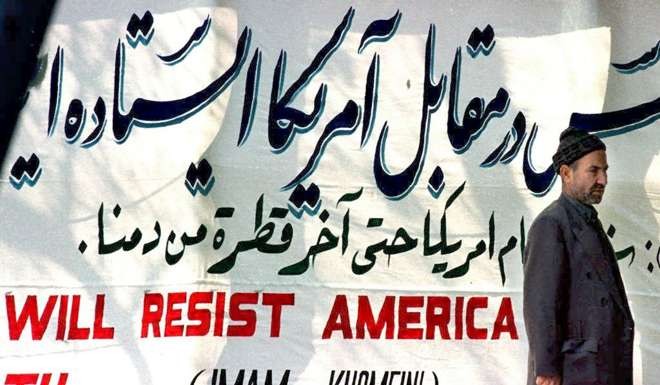
If the US is the ‘Great Satan’, why do so many Iranians enter the green-card lottery?
Almost a million Iranians were in the running for the US visa lottery last year
In Tehran, the ritual is becoming as familiar as the “Death to America” chants at Friday prayers.
It’s the yearly rush to enter a lottery for the chance to immigrate to the United States.
“I want to experience a new life in the US. Why not?” said Milad Nazari, a spiky-haired 29-year-old working at a sleepy florist in downtown Tehran.
“‘Death to America’? I don’t care. The US is the most powerful country … so why shouldn’t I take my chance in the lottery?”
This month the US State Department opened a five-week window for visa applications from citizens of countries that historically have had low rates of immigration to the United States.

Those numbers included nearly 500,000 Iranians and 432,000 spouses and children, among the most of any country, though a slight decrease from 2014. About 5,000 Iranians were selected for visas; only Cameroon and Liberia had more winners.
Entries from Iran have risen sharply from 150,000 in 2007, reflecting both Iranians’ enduring fascination with the United States — despite official propaganda labelling the US the “Great Satan” — and worsening prospects for the middle class in a country ravaged by economic sanctions.
“I have worked hard but not been able to save enough,” said Naser Zaeim, manager of a printing house in Tehran.
Standing under a printing machine and wiping his greasy hands, Zaeim, 45, said he had missed previous lotteries but planned to apply before this year’s November 7 deadline. Winners are granted visas starting in 2018.
As a young man, Zaeim spent two years as an unskilled laborer in Japan, where he saved enough to buy a small apartment.
“I see no future here for my three children,” he said.
Saeed Mohammadi, an air-conditioning repairman, entered the lottery unsuccessfully the last two years. Although he said he was satisfied in Iran economically, he found the prospect of life in the United States thrilling for his wife and 10-year-old son.
“I earn enough here, but I don’t have enough leisure time,” said Mohammadi, 33. “I want to work and relax too. Here the only option is to drive north for a holiday and rent a vacation home on the Caspian Sea for a few days. There is no fun in Tehran.”
Such comments do not please Iran’s hard-liners, who oppose any warming of relations with the West. They have tried to undermine the 2014 nuclear deal that President Hassan Rouhani, a relative moderate, struck with the United States and other world powers, arguing it has not brought economic relief.
The archconservatives have characterised Iranians with dual citizenship in the West as security threats, and cheered last week when two Iranian Americans were sentenced to 10-year prison terms on vague charges of spying for the United States. Last Wednesday, the Qalam news outlet reported that 35 dual nationals had been dismissed from managerial positions in state-run companies.
American critics of the Diversity Visa programme, begun in 1990, say it is an arbitrary way of choosing new immigrants. Applicants must have at least a high school education or its equivalent, or two years of experience in a semiskilled profession, but opponents of the lottery say it does not ensure that new arrivals are prepared to contribute to the United States.
They say Iran’s hostility to the US also raises questions about whether it should be included in the programme.
“Certainly, everything ought to be on the table when it comes to saying to the Iranians, ‘We’re not going to tolerate this behaviour,’” said Ira Mehlman, spokesman for the Federation for American Immigration Reform, which advocates reducing immigration across the board.
“In general we ought to look at people based on individual merit and give the proper amount of scrutiny to make sure they don’t pose a danger and don’t adhere to ideologies that threaten the safety of this country. You need to put everyone through a rigorous vetting process, which clearly we do not do.”

